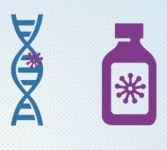5 Health Data Infrastructure Hurdles for Precision Medicine

- The National Institutes of Health (NIH) hopes to enroll 1 million volunteers in a Precision Medicine Initiative (PMI) study over the next three to four years. In order reach its goals for maximizing effectiveness of disease treatment and prevention, however, the project will have to surmount significant health data infrastructure challenges.

On Sept. 17, the PMI Working Group published its implementation blueprint to NIH Director Francis Collins, MD, who said he would “act immediately” on the recommendations. “We now have a design plan and it’s time to move forward,” Collins remarked during a conference call with reporters.
The report says advances in analytics — combined with reduced cost for data storage and widespread adoption of personal mobile technologies — set the stage for better ways to anticipate individuals’ risk for developing disease. The Obama Administration has budgeted $215 million to PMI in fiscal year 2016, with $130 million of that total allocated for NIH to build the expansive research cohort. An additional $5 million would go to the Office of the National Coordinator for Health IT to support the development of interoperability standards and requirements that address privacy and enable secure exchange of data across systems.
Study participants will include volunteers who consent to undergo a baseline exam and provide a biospecimen, as well as people already enrolled in studies at large provider organizations such as Kaiser Permanente, Partners Healthcare, Mayo Clinic and Geisinger Health System.
The working group’s plan takes into account the following data considerations:
Data types will be diverse. The variables acquired during enrollment will form a “core data set” that will enable cohort-wide analyses and identification of subcohorts for specialized studies. The initial core set will include data from EHRs, payers, participant surveys, mHealth technologies and biologic investigations, and would be expected to grow over time.
A common data model will be required. While data from direct volunteers and provider organizations can be organized similarly, data types from clinical investigations may not be easily transformed to existing or created standards. The working group recognizes that standards do not exist for many sensor technologies, for example, and therefore recommends “early selection of commonly used mHealth technologies to gain experience in use and integration of these new modalities.”
PMI cohort data must be secured. In general, summary data would be accessed and analyzed in de-identified forms, but role-based access would be granted for individual-level data. Rigorous security testing would be employed and response plans developed in the event of a privacy breach.
A single point of contact will need to be developed. The report recommends a national “Coordinating Center” for assembling and sharing data and biospecimens, facilitating participant communication and conducting research studies. For data storage and access, the working group calls for “a hybrid data and analytics architecture that leverages both centralized storage of core data while preserving federated access to additional data at nodes across the network, as needed by specific studies.”
Data-use policies will need to be established. Laws, regulations and policies “surrounding research, data security and privacy, and access and interoperability of EHRs,” according to the report, will influence the project. Gaps and conflicts will need to be addressed. In addition, an internal framework of policies will be needed to address issues such as potential misuse of information and data sharing.
Image credit: National Cancer Institute
